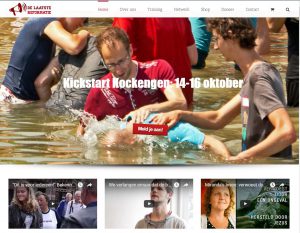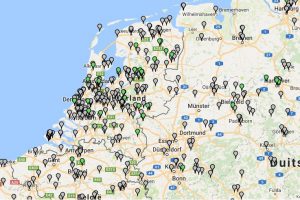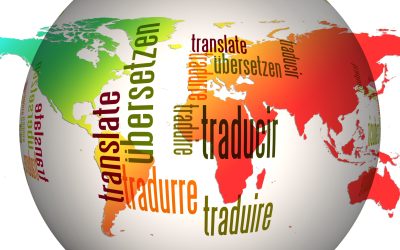A while back I discovered "The Last Reformation" on the Internet. Not long after that, I saw a car in the village parking lot with on the back in cows of letters DELAATSTEREFORMATIE.NL. And finally I spoke to someone in September who started about that. After we got acquainted, he told me when asked that he knew the Lord Jesus as his Lord and Savior and that he – if I remember correctly – went to the Christian Reformed Church. Then suddenly he asked if I knew Torben Søndergaard. Now I had already forgotten that name, but I could still make the connection to The Last Reformation (DLR). It turned out that he was quite impressed by it and wanted to know what I thought of it. I don't remember exactly how the conversation went, but in any case I told him that this is serious heresy, which we should not get involved in.
That is why we pay attention to it here.
The Last Reformation – what is it?
This is what they write on their website:
The Last Reformation is a new movement that started in 2011 and is now moving at a rapid pace around the world. The message is particularly popular in the Netherlands. The Netherlands is therefore the country where this movement is growing the fastest. It's about seeing again what we read in the book of Acts. We believe that what we read there is also for today and that we should live a similar life to the early believers. This requires a reformation of the church, because most churches are very far from the reality of Acts.
The current Protestant church resembles the Roman Catholic Church in so many ways and so little like what we read in the Bible and especially the book of Acts. That's why we need a reformation that goes so much deeper than the reformation Martin Luther and others came up with. We are talking about a reformation that is about doctrines, the Holy Spirit and the church system. Why do we do church this way?
 They express their vision as follows:
They express their vision as follows:
First of all it is important that we return to the gospel again. The gospel is the foundation and if there's one thing we can't take away from it, it's the gospel. The gospel is not "asking Jesus into your heart," or saying a sinner's prayer, or simply believing in the existence of God. No, Jesus said we should follow him. And in order to follow him, we must, as Jesus said, be born again. Born of water and born of the Spirit. We are talking about acknowledging our sins and repenting of them to God, believing in Jesus and being baptized in his name and then receiving the Holy Spirit. That means to be born again. We must proclaim this to every church, every household, every Christian! For there are many churchgoers who are not really born again and they too need to hear the gospel.
The following what we want to do is kickstart all the Christians in the life we read about in the Bible. Kickstarting means training people, discipling them to do the things, not just hear, but do. Which things? Healing the sick, casting out demons, preaching the gospel, baptizing people in water and baptizing people in the Holy Spirit. It's about making disciples!
And last but not least we want to see a reformation of the church. A church that goes back to the simple life with God that the first disciples lived in Acts. A church where Jesus is the head and we are all brothers and sisters. We are all led by the Holy Spirit. The church is not a building, not a meeting, not a program. No, it is a movement of disciples of Jesus, a family, a life.
Wat are they doing?
They have their own website and a lot of material is also on YouTube. When you look through that a bit, you get the following picture.
- The Gospel on the Street. Many of the activities take place on the street. People are being talked to. The gospel of repentance and forgiveness of sins is presented to the people.
- Prayer and healing. People are also asked if they might have diseases that they would like to be cured of. People are then prayed for and there are quite a few cases where people testify that they are healed.
- baptize. People who convert are baptized as soon as possible. It is taught that one also receives the Holy Spirit. In many cases you see that there is speaking in tongues, both by the one who is baptizing and by the one who is being baptized.
- kickstart. After baptism, people are preferably taken along as soon as possible in a so-called 'kickstart'. They take to the streets to evangelize and to heal people. They are shown how to heal people and then a 'newbie' can try it too. If someone has done it a few times, he or she can also do it themselves[1].
How to assess?
There is undoubtedly a lot to be said about DLR[2], but we try to limit ourselves here to a few salient points.
Be baptized and receive the Spirit.
When a person turns to God and accepts the Lord Jesus as Savior and Lord, he is born again and receives the Holy Spirit. That is 'by God' and by grace, not by some human act. See, for example, Galatians 3:2, Titus 3:5, 1 Peter 1:3,23. We are then also 'baptized with the Spirit', which is not a separate activity or moment, but another aspect of a person receiving the Holy Spirit upon conversion. The 'baptism with the Spirit' refers to the fact that we are then also added to 'that one body', the congregation of the Lord Jesus Christ.
“After all, we are all through één Spirit to éébaptized into one body, whether we be Jews, or Greeks, or slaves, or free; and we are all from één Spirit drenched” (1 Corinthians 12:13).
Whenever someone speaks of "the baptism of the Spirit" as something separate, we should be suspicious. After all, it is unbiblical and the question then is what one wants to do with it. This is not always immediately apparent, but often it is.
This is also the case here at DLR; one baptizes a person in water, with the hands being laid on, and the baptized person – so they say – also receives the Holy Spirit. The 'proof' of this is then that the baptized person also begins to speak in tongues. Speaking in tongues is an important phenomenon in DLR and is also used (so one learns – eg at 5'50” from the video Lesson 11) to 'receive revelations, draw close to God, receive visions or prophecies'. According to DLR, what someone receives in this way can also be passed on. It is literally said that you can 'baptize others in the Holy Spirit'!
The false teaching that one must be baptized in or with the Holy Spirit opens the door wide to demonic influence and manifestations.
Transmission of demonic influences
Something does happen at the DLR baptism and it is no nonsense that people experience something special at such a baptism. But it is not the Holy Spirit that receives the baptized person. They are demonic influences that are transferred from the one who baptizes to the person being baptized. The 'proof' of that is speaking in tongues [3], an expression of demonic activity. But it feels good and people think it's the Holy Spirit! (also see here).
It is in fact the same deception that we alsoThere is more!” and which is there called 'impartation' (transfer).
Healings
The simple basic idea behind DLR is that we should do what Jesus did: preach the gospel and heal people. That is the commission for every believer. That is why this is also what DLR is consistently trying to put into practice.
We pay no further attention to the 'cures' here; that has to be done separately. Here just a few notes.
- Can it really be that in a setting where so much demonic activity takes place – such as eg transmission of demonic powers, tongues, visions – God confirms this with miraculous healings? I don't think so.
- When 'healings' do take place, it can only come from the dark well of God's adversary. Similar 'healings' also occur with Reiki and similar practices.
- There is no question that our God can heal the sick. But it is not His work in the setting as we find it at DLR.
DLR is attractive and accessible
Apparently what DLR brings is appealing to many people. Probably also for many Christians who think that what they encounter here is the Christian faith as it was intended. No church organization with buildings, but simply preaching the gospel and healing. A gospel of repentance and forgiveness of sins is brought and the Christian life, at least as they teach it, is lived out in practice.
DLR is also very accessible and approachable. It's for everyone and you don't have to join a church or community. You don't have to go to a specific meeting, for example of Jan Zijlstra or Randy Clark, to experience something 'of the Spirit'. It is no wonder that it attracts many people – probably especially Christians.

How's it going?
We live in a time when many are increasingly
“(…) falling away from the faith and turning to deceiving spirits and teachings of demons” (1 Timothy 4:1).
"For a time will come when they will not endure sound doctrine, but <will look for what> caress the audience (…). They will turn their ears away from the truth and turn to fictions.” (2 Timothy 4:3,4)
As long as the Lord Jesus does not return, the developments as described in these bible texts will continue. DLR will really not be the last phenomenon. Worse forms will undoubtedly arise; just be prepared for it.
“But abide with . . . the holy scriptures, which are able to make you wise unto salvation through faith which is in Christ Jesus.
All Scripture is divinely inspired and is beneficial for teaching, refuting, correcting, and training in righteousness, that the man who belongs to God might be perfect, fully equipped for every good work.” (2 Timothy 3:14-17)
[1] The idea behind the 'kick start' is similar to the kick start of a motorcycle or moped. A (kick-start) pedal was pressed, causing the engine to run. The engine is thus 'kickstarted'. After that, all you have to do is give it gas to drive. That is also behind the kickstart at DLR: you experience the kickstart session, experience what it is like to pray for people and heal them and then you can do it yourself. You are then 'kickstarted' and after that all you have to do, so to speak, is to accelerate to make it happen. You can do it yourself and you can pass it on to others.
[2] See also an extensive review here.
[3] By 'tongues' here is meant gibberish, not understandable normal language



